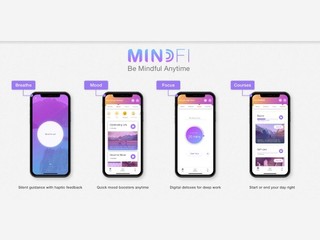

Asia, for example, is also experiencing a surging awareness and demand for mental health as a result of the pandemic, but that’s where the similarities with the United States end, said Bjorn Lee, founder and CEO of MindFi, a Singaporean corporate mental health and wellness platform, which announced a $750,000 (SG$1 mllion) pre-seed funding round on Monday.
For one thing, he explained, Asia is much more culturally diverse and mental health has more social stigma than in America.
“You have to be respectful and sensitive to the nuances of social etiquette, corporate culture and linguistic differences in administering the same kind of mental well-being advice across various countries of Asia. What works for a Tokyo office worker in a Japanese conglomerate won’t work for a Jakarta colleague in the same company working in the Indonesia office,” he said.
In addition, there were multiple lockdowns in Asia during the pandemic, more than in America, due to proactive enforcement, which forced many people to work from home, something that Lee says has been “very unpopular and is causing much stress among employees.”
MindFi looks to solve these problems by offering employees personalized recommendations, 24/7 guided self-care programs and intelligent matching with coaches and therapists, all in one mobile app.
The company, which was inspired by the World Health Organization’s Well-being Index (WHO-5), makes recommendations that are powered by a proprietary AI algorithm that creates a user’s unique psychometric profile, using data, such as a user’s daily steps, sleep, mood, breathing and heart rates. All employee data is anonymized and aggregated to generate analytics reports which HR leaders can then use to make better decisions on workforce health and performance in an evolving workplace environment.
MindFi chose to be a corporate solution because of Lee’s own experience with work stress when he was working in Silicon Valley back in 2011.
“I battled chest pains for over a year and it cost me dearly, both in time and cost. I gradually realized that I spent too much at time at work and it was the cause and the effect was that I brought my work stress home to my family. That was when I realized that the workplace is the mothership of stress and that we need to redesign workplace culture and prioritize mental wellbeing for the future of work.”
The company now has over 30 enterprise clients across Asia, and third party research with its university and hospital partners has shown that one month of regular usage on the MindFi app can reduce depressive symptoms up to 30% at an individual level. It is also able to elevate the mental wellbeing levels of 68% of its users within one month, based on the World Health Organization’s WHO-5 scores.
The company’s new funding round came from iGlobe Partners, M Venture Partners (MVP) and prominent angel investors such as Koh Boon Hwee, Patsnap founder and CEO Jeffrey Tiong, Zopim co-founder Lim Qing Ru, Natasha Foong, Aakash Degwekar and Shadab Farooqui.
MindFi plans to use the funding to accelerate product development, specifically emphasizing AI automation of mental care recommendations, as well as group-based activities that foster social wellbeing and “wellbeing analytics,” which are customised for companies of all sizes, including those with tens of thousands of employees.
It also plans to expand its team, which has tripled over the last six months to 15, with plans to double, or even triple, the number again over the next year, with more remote employees across Asia.
Along with the funding, it was also announced that Erica Johnson, co-founder of Modern Health, has joined the company as an executive adviser.
“Erica brings her deep operational expertise from founding and advising Silicon Valley unicorn startups to help us accelerate our growth in the fast-growing Asia-Pacific market. She has a unique flair for splicing scientific research, especially the importance of culturally competence in mental care, into product development, which will be very valuable for us in gaining adoption across our Asia-based clients,” said Lee.
MindFi’s goal is to get people to see having a healthy mind as being equally, or even more important, than having a healthy body. And Lee expects a solution like MindFi, which was selected for Y Combinator’s Summer 2021 program, to only become more important as the pandemic evolves or winds down.
“We expect the Pandora’s box of mental health to stay unshut and companies to begin a transition from mental health conversations to mental performance, or emotional fitness issues in the workplace,” he said.
“Leaders and teams will be evaluated on their ability to build and maintain psychological safety in their daily operations. HR leaders will be expected to report on the sustainability of their people management in their annual sustainability reports, which heralds a rise in wellbeing analytics that is a big focus for MindFi.”














